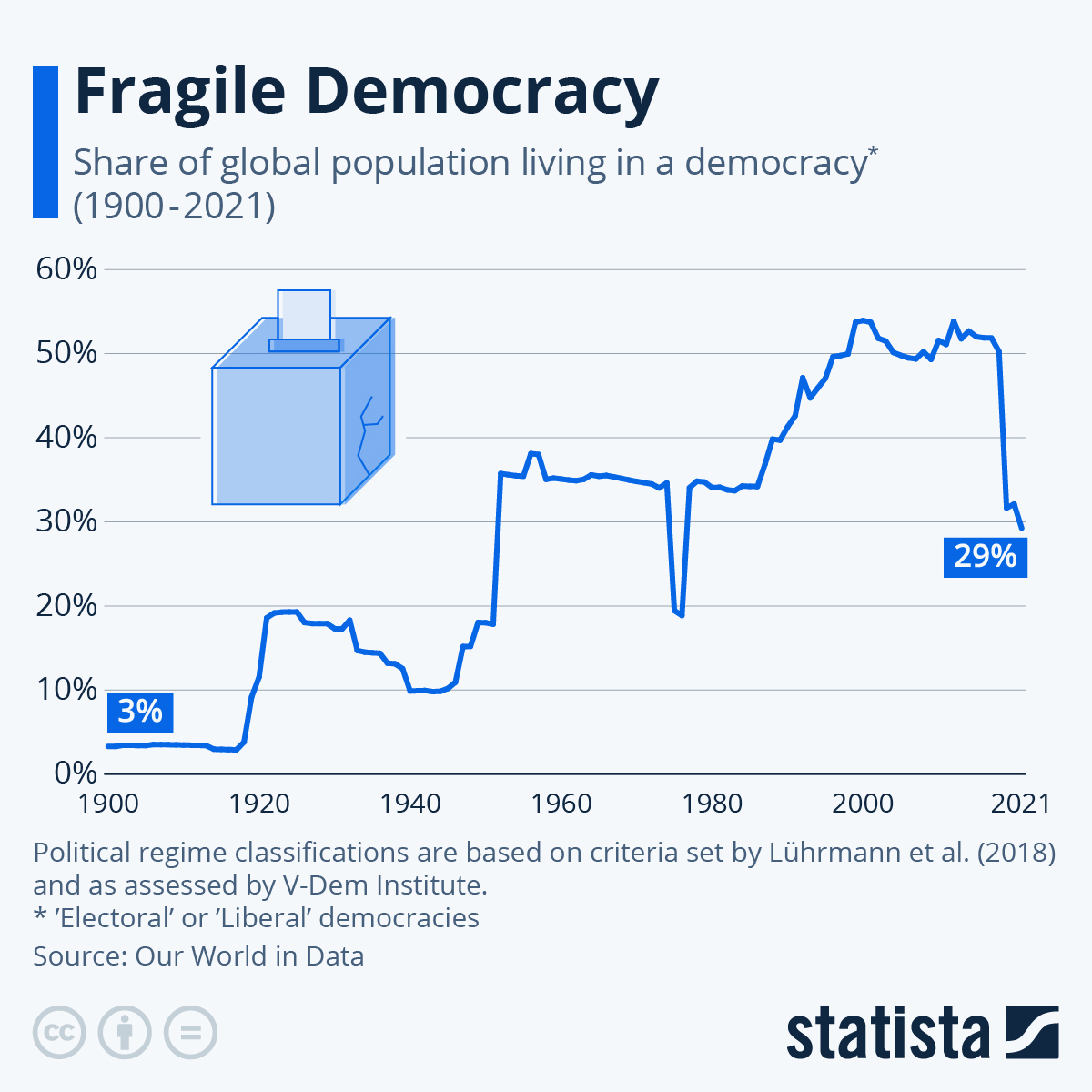
With comparisons to January 6 immediately being drawn, thousands of supporters of Brazil’s far-right former president Jair Bolsonaro forced their way into the country’s congress, presidential palace and supreme court on Sunday. It took roughly three hours for security forces to regain control of the situation, with at least 300 arrests being made. The main motivation behind the riot has been linked to Bolsonaro's followers' refusal to accept the results of October's election, which led to the return to power of leftist Luiz Inácio Lula da Silva.
While democracy has held out in the United States after the Capitol riot and so far in Brazil now too, an analysis collated by Our World in Data highlights how fragile it can be.
The share of the world living in either an electoral or liberal democracy was at its highest in the year 2000 when the figure was at 54 percent.
As Statista's Martin Armstrong shows in the infographic below, 'global democracy' took a steep dive in 2019, dropping from 50 percent down to just 32. While the fragility of democracy is also plain to see elsewhere in the chart, this is the most dramatic example over the assessed period.
You will find more infographics at Statista
The main cause of this decrease was India and its downgrade by Freedom House to a 'partially free democracy' and to an 'electoral autocracy' by the V-Dem Institute at the University of Gothenburg since Modi's win in the country's 2019 election. The latter downgrade was justified by the alleged "increased pressure on human rights organizations, rising intimidation of academics and journalists, and a spate of bigoted attacks, including lynchings, aimed at Muslims" leading to a "deterioration of political rights and civil liberties".
The rise of democracy has been one of the greatest collective human achievements of the last century, allowing large shares of the world's population to live in relative freedom and have the ability to alter the politics and society of their country. Has this expansion already peaked though?
With comparisons to January 6 immediately being drawn, thousands of supporters of Brazil’s far-right former president Jair Bolsonaro forced their way into the country’s congress, presidential palace and supreme court on Sunday. It took roughly three hours for security forces to regain control of the situation, with at least 300 arrests being made. The main motivation behind the riot has been linked to Bolsonaro’s followers’ refusal to accept the results of October’s election, which led to the return to power of leftist Luiz Inácio Lula da Silva.
While democracy has held out in the United States after the Capitol riot and so far in Brazil now too, an analysis collated by Our World in Data highlights how fragile it can be.
The share of the world living in either an electoral or liberal democracy was at its highest in the year 2000 when the figure was at 54 percent.
As Statista’s Martin Armstrong shows in the infographic below, ‘global democracy’ took a steep dive in 2019, dropping from 50 percent down to just 32. While the fragility of democracy is also plain to see elsewhere in the chart, this is the most dramatic example over the assessed period.
You will find more infographics at Statista
The main cause of this decrease was India and its downgrade by Freedom House to a ‘partially free democracy’ and to an ‘electoral autocracy’ by the V-Dem Institute at the University of Gothenburg since Modi‘s win in the country’s 2019 election. The latter downgrade was justified by the alleged “increased pressure on human rights organizations, rising intimidation of academics and journalists, and a spate of bigoted attacks, including lynchings, aimed at Muslims” leading to a “deterioration of political rights and civil liberties”.
The rise of democracy has been one of the greatest collective human achievements of the last century, allowing large shares of the world’s population to live in relative freedom and have the ability to alter the politics and society of their country. Has this expansion already peaked though?
Loading…






